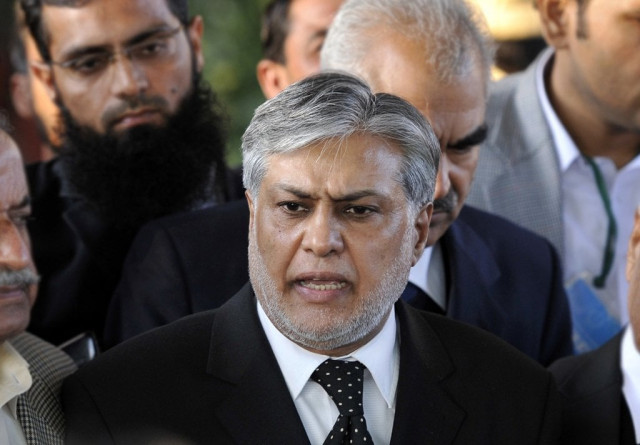Debate winds down: Govt to retain GST at 17%
Finance minister assures lower house that the rate will be cut once economy stabilises.

Finance Minister Ishaq Dar. PHOTO: AFP/ FILE
Despite scathing criticism from both inside and outside parliament, the government has decided not to withdraw the proposed 1% increase in general sales tax (GST).
While winding up the budget debate in the National Assembly on Saturday, Finance Minister Ishaq Dar said the proposed increase in GST would earn the government Rs50 to Rs60 billion in additional revenues in fiscal 2013-14.
“The national economy’s present condition warrants the 1% increase in GST. The 17% GST rate is applicable in many countries like ours,” said Dar as he assured the lawmakers that the rate would be brought down once the economy improves. He cited the Rs374 billion revenue shortfall and Rs602 billion additional expenditures as some of the reasons for introducing and retaining the GST hike.
“If we don’t mobilise the tax resources, we cannot meet all government expenses, including the circular debt … we do not want to print currency as it will trigger an explosive inflation,” he added.
The finance minister explained that the government would have to engage the International Monetary Fund (IMF) and other monetary institutions for loans, pushing the country’s debt further.

“Pakistan will be a defaulter if it does not pay back debts in time. We’ve to make the first installment of $3 billion this year,” said Dar, adding that the previous government had already obtained and utilised its quota of 200% debt.
“We were given an empty kitty from which we cannot pay back foreign debts. We cannot print dollars either,” the minister said. An IMF team was present in the country for post-programme monitoring which would continue until the debt is brought down below the limit, he added.
The minister assured the house that the national interest would not be compromised by any engagement with the IMF or other monetary bodies.
Responding to criticism over the proposed budget, Dar said the government has decided to raise the minimum wage for workers and labourers from Rs8,000 to Rs10, 000 effective July 2013. However, he reminded the lawmakers that labour has become a provincial subject following the 18th constitutional amendment.

For the first time in the country’s history, the government has incorporated 21 proposals from the Senate as amendments in the finance bill, the minister told the house. In the past, finance ministers used to throw such suggestions into the dustbin within 10 seconds,” he added.
Talking about the much criticised Hajj tax, Dar clarified that the government has proposed to raise the existing Rs2,500 per person tax – being collected from Hajj operators – to Rs3,500. This would be a direct tax which has been imposed in line with the rising revenues of the operators and could not be passed on to pilgrims.
In his speech, the minister said that although the tax-free status of non-profit institutions would continue, they would have to get a one-time certification from the income tax commissioner. He said the government has also decided to decrease the rebate of tax applicable to teachers and researchers from 75% to 40%.
Dar attempted to dodge Pakistan Peoples Party’s criticism over the change of the name of Benazir Income Support Programme (BISP), saying that while its name had been retained, it had been grouped along with five other programmes under the umbrella of a broader Income Support Programme (ISP).
Despite this, PPP lawmakers resorted to desk-thumping in protest, saying that the move was the same as removing Benazir Bhutto’s name from BISP.
Leader of opposition Khursheed Shah claimed that all six programmes grouped under ISP were originally part of BISP, adding that they had just been separated under different titles now.
Shah also criticised the increase of the BISP stipend from Rs1,000 to Rs1,200 announced by the government, saying the amount should have been increased to Rs2,000 in light of the high inflation.
Published in The Express Tribune, June 23rd, 2013.


















COMMENTS
Comments are moderated and generally will be posted if they are on-topic and not abusive.
For more information, please see our Comments FAQ